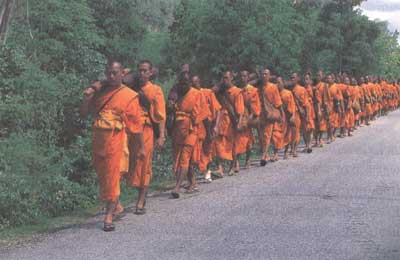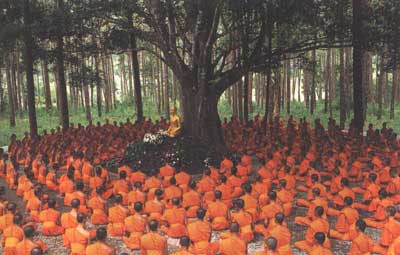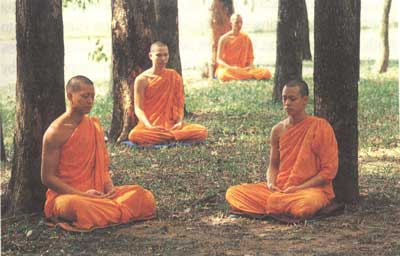สารบัญ
The Importance of Ordination
would like to begin my talk to-day by first asking you all one simple question. Ask yourself, up to the present day, what is it that you want most in Life? Alternatively, what is it that you are seeking?
I have asked this question many times before, and the answer has always been the same. We are all looking for happiness. All of us here today seek a way to true happiness.

When I ask whether anyone has found the happiness that we are all searching for, many people reply 'yes'. Nevertheless, upon closer examination, when asked to truly think about their answer, most will hesitate to say that what they have found is true happiness. This is because the happiness that many of us experience in life is only momentary. It is not true happiness. For true happiness is completely free of suffering. Moreover, although we spend our lives searching for it, we have not yet found our true happiness.
Whether we live one lifetime, or ten thousand lifetimes, without the wisdom of Lord Buddha, we will never find true happiness. There are some groups of people, who believe that worldly pleasures bring true happiness, but this is not true.
[read more click button below]
What is True happiness?
Lord Buddha blessed us with his knowledge of true happiness 2,500 years ago. He difined true happiness in to two categories.
1. Happiness that depends on material possessions: [Samisa-sukha] are things such as material possessions (like money or jewelry, or people such as husband, wife, and children), that lead one to believe that one has true happiness. This type of happiness is impermanent, and will eventually bring suffering into your life. For example,
the desire of young people who seek happiness in companionship; once they find their match they are happy, but then later on comes the suffering. Suffering in the form of concern, worry, jealousy, pride, pain, disappointment, etc... Sometimes the situation can end in divorce. This pain may one day overwhelm any of that initial joy experienced in the beginning.
2. Happiness achieved through Dhamma. [Niramisa-sukha], This is the only form of true happiness, one that is free from suffering, and the point from which the individual will eventually discover Nibbana.
Without the teaching of the Lord Buddha, the search for Niramisa-sukha; happiness free from worldly possessions, would be a difficult endeavor indeed. Even Lord Buddha, had to endure six arduous years of self-mortification before discovering Niramisa-sukha. During this period, the Buddha came close to death more than once, but when he finally found true happiness, he chose to share with us the wisdom of his experience by showing us the path to Nibbana, beginning with ordination.
"He who lives outside Dhamma {the layperson), walks on a narrow path clouded from the truth. By embracing Dhamma, one is bathed in the light of truth. He who lives by worldly possessions will find that perfection and purity will remain beyond his reach. Therefore one must shave one's head, don saffron robes, and ordain into a life free from worldly possessions."

Sometimes in life, even when we desire to live according to the precepts, there are times when we must lie. For example, a secretary whose responsibility is to arrange meetings for his/her manager must sometimes lie when the manager does not wish to meet certain individuals.
Even in professions held in high esteem, such as teachers, who are responsible for educating students and doctors who care for the health of the community - all are vulnerable to commit sins. There are many occupations where the nature of the job makes avoiding sin and bad kamma almost impossible. For example, farmers who must kill insects and livestock, military personnel, who must at times kill enemy soldiers, or sales people, who find it difficult to work without exaggerating.
The life of a layperson is a narrow one where even the opportunity strictly to observe the Five Precepts is often compromised.The chance to live a life according to the Dhamma, and find inner peace is not easy.
Even when the individual knows about the benefits of ordination.it is no small task to give up family and worldly possessions for the sake of Dhamma.The individual must have a strong inner desire, love and support from family and close friends, plus the merit accrued over previous lifetimes.
Lord Buddha told the story of his ordination to his disciples as follows. At the time he was young, his hair was dark, and he was full of youthful vitality. His parents did not want him to enter the monkhood and they despaired at his decision. Eventuallydespite their dissuasion he went ahead and shaved his head, dressed himself in monks' robes, and left his home to live a life free from worldly possessions
Motives for Ordination during the 'Time of Lord ' Buddha
During the time of Lord Buddha, men were motivated to be ordained because of the prevalence of faith in their life for the teachings of Lord Buddha, and in their desire to become an Arahant, a person who has rid his mind of all impurities. Some of these Arabants accumulated great merits over past lives. One child of only seven years of age even after listening only briefly to the teachings of Lord Buddha was immediately capable of understanding the existence of suffering in the world, and thus decided to be ordained without any hesitation. Even before the monks finished shaving his head, the boy had already become an Arahant. This 'Arahant' name was Dabbamallaputta, one whose birth in this world was fraught with difficulty.
Story of Dabbamatla-putta
when Dabbamallaputta was in his mother's womb, nearing his time of birth, his mother suddenly died. Many people were under the impression that he also, must have perished with his mother. So his relatives took the body of his mother to a place of cremation according to Indian tradition. As the flames of the funeral pyre began to engulf his mother's body, her womb opened and the body of Dabbamallaputta emmerged and came to rest upon a tuft of Elephant grass. If any other child had come into this world under such dramatic circumstances, it would most certainly not have survived. Nevertheless, Dabbamallaputta'ร birth was indeed a miracle. He grew up under the watchful care of his grandmother.
Dabbamallaputta escaped death twice. First when his mother suddenly passed away; under normal circumstances this would have meant death for the unborn child. However, he did not die. Second, when he escaped his mother's womb as her body lay on top of the funeral pyre, and came to rest on a tuft of Elephant grass. That is where his name originated. Mallaputta meaning the child of the Malla family, and being his family name, and Dabba meaning wild grass.
Later on the young Dabbamallaputta ordained as a novice. While a novice, Dabbamallaputta earned the respect and admiration from the monks at Wat Jetavana. The temple community saw Dabbamallaputta as a person of great knowledge and talent, such individuals being hard to find in this world.
The Story of Rathafala
Like many other holy men before ordaining, Rathapala desired worldly possessions. Nevertheless; the mercy, wisdom, and purity of the Buddha's teachings, managed to guide Rathapala along towards the path of ordination.
Rathapala was the son of a wealthy family in Kururath Province, India. Before he was ordained, he lived a sheltered and comfortable life, more so than many of his fellow men. However,Rathapala chose to be ordained. Many in his province and village criticized and gossipped about the news of his decision to be ordained. Even the Raja who ruled over Kururath, felt that Rathapala's decision to be ordained was indeed strange,

when the Raja inquired why a person might ordain, the response he was given, was as follows. When confronted with one or all of the following four circumstances, a person usually seeks refuge in the monkhood
1. Old Age - The deterioration of one's physical state and abilities, finding that your life has no more roads to journey on.
2. Illness & Disease - When one's body and health is afflicted with some illness and you are unable to move forward in the world.
3. Poverty - when you reach that point in your life where you no longer have monetary resources to advance your life.
4. Shunned by Society - when your peers or those in your community no longer accept you
One or all of these circumstances often push people to turn towards a life of refuge in the monastic community.
The Raja commented that Rathapala was not yet old, he was still strong and healthy, living a life free from poverty and surrounded by many family and friends who loved and respected him. Why then, has he chosen to be ordained?
In ancient time, many men chose to be ordained when confronted with four circumstances, although they had no faith in religion. Even during the time of Lord Buddha, many people were ordained without faith in Buddhism. It is therefore not surprising that the Raja found Phra Rathapala'ร decision to be ordained, a curious thought indeed.
Phra Rathapala explained to the Raja that he had his own four reasons for ordination these having been taught to him by Lord Buddha. That in one's life there are two types of suffering: suffering that is unavoidable (past), and suffering that is avoidable (present).
"All men are bound by unavoidable suffering from previous lives, and yet we still reach out and grasp at more suffering to add on to those from the past."
These unavoidable suffering comprises:
1. That ageing is something that cannot be avoided. Those who are wise should be always aware of this.
2. All living things are mortal. Death is something no living being can avoid.
3. No one ever truly owns anything, for when you die, you cannot take anything with you.
Suffering that is avoidable grows out of one's constant desire for more. People with such suffering are those who hunger incessantly and are never satisfied. It is because they are a slave to their never ending desires. People want everything that they see, and even once they get it, they still yearn for more.
The 'Endeavours of the Arahants to Preserve 'Buddhism
Buddhism has managed to grow and prosper to the present day, even though the Buddha passed away over 2,500 years ago.lt will continue to advance further, ad infinitum. The following is what Lord Buddha taught to Ananda before passing away, "Ananda, after I leave this world, my Teaching (the Dhamma) will be your teacher in my place."
The Buddha blessed us with his Teachings and his sense of Discipline to carry us forward in his place.' The gifts he gave us have passed the test of time and shown themselves to be timeless. Due to the relevance of the Buddha's teachings, despite the passage of time, his disciples have been able to pass on the Dhamma to this present time.
Even more important, the determination and faith of Lord Buddha's disciples, and their desire to spread the Buddha's teachings, are truly deserving of our respect for their endeavours, so that we may learn from their life story, and set them as an example to follow. One of these monks whom we can learn from is Rohana
The story of Phra Rohana and Phra Nagasena

Rohana was a monk who, after the death of Lord Buddha, had a revelation. He saw that the child Nagasena, the recently born son of a Brahmin, would play an important role in the spread of Buddhism in the future. This child possessed unusual intelligence and wisdom. Rohana began seeking alms at Nagasena'ร house following the child's birth and continued to go everyday, for seven years, despite Nagasena'ร family never having offered any alms.
When asked why he had done this, Rohana replied that he did not want or expect anything from the family, he merely wanted the child to become accustomed to seeing a monk. Rohana knew that the child's instincts possessed great curiosity. If the child were to see Rohana often enough, he might begin to ask questions, and that would open the opportunity for Rohana to show him the way of the Buddha's teachings. In the end, Rohana'ร patience paid off when Nagasena reached seven years of age. Nagasena had grown up to become a child more gifted and talkative than any others of his age. One day, while Rohana was seeking alms in front of Nagasena's house, the child came to him and asked:
"How come your hair and your beard do not look like any one else's? Why have you shaved off your hair and beard?"
Rohana was very happy that his perseverance paid off. He took great care in answering in full detail, Nagasena's question. Due to the child's unusual intelligence, he was satisfied with Rohana's reply.
"I wanted to leave these worries and suffering behind, which are..."
1. Worrying about choosing the clothes that would go with my look and my hairstyle.
2. Worrying about deciding what accessories to wear with my clothes.
3. Worrying about finding a good jeweler to design and make my jewelry.
4. Wasting time in cleaning those items.
5. Worrying about maintaining those items in good condition.
6. Worrying washing and cleaning my clothes
7. Worrying about finding flowers to decorate my hair.
8. Worrying about searching for fragrance to wear.
9. Worrying about finding scents for potpourri.
10. Worrying finding Nutgall.
11. Worrying about finding Tamarind.
12. Worrying about finding clay to mix with the Nutgall and Tamarind to make shampoo.
13. Worrying about finding a piece of wood to pin down my hair.
14. Wasting time in curling my hair.
15. Wasting time in combing and styling my hair.
16. Worrying about finding someone to dress my hair.
"If you too can leave all these worries behind, then you will be aware that there are more important things in life such as meditation. If you spend your time meditating diligently, you will be pure of mind, able to find true happiness, and accepting of life's suffering."
After listening to Rohana, Nagasena was impressed with what Rohana had to say and thus he desired to learn more about the Buddha's teachings. Nagasena then asked for permission from his parents to be ordained as a novice. After the permission was granted, he was ordained under the supervision of Rohana, continued to practice the teachings of the Buddha, and became an enlightened being in a very short period of time.
Having lived a life of purity from the age of seven, and faithfully studying and practicing the teachings of the Buddha, not only did Nagasena rid himself of worldly desire and become an enlightened one, he also became well versed in Buddhist knowledge and very adept at giving sermons.
Nagasena's sermons were so effective in preaching people that even King Milinda the great ruler during that time, upon hearing Nagasena, gave up his riches and was ordained to become a holy one himself.
King Milinda was lost in his belief that he was smarter than anyone else. He always asked people he came into contact with, such as novices from different faith, and even holy ones, questions about the Dhamma, often to the point of embarrasment, as he asked questions they were not able to answer. However, after meeting Nagasena, he was unable to corner him on any questions. The more he asked questions, the more he felt the wisdom of Nagasena, and in turn he sought to become Nagasena's disciple.
The news of King Milinda's encounter with Nagasena quickly spread throughout the land during that time. "The Questions of King Milinda," is a book that recorded some of the questions and answers that the two debated.
There are numerous stories of those who had enough faith to push them to be ordained since the time of the Buddha. In each and every story, there are many lessons that can be learned, One common theme in all these stories, is that you must strive and persevere to do your best, in order to be free from suffering in this life.




